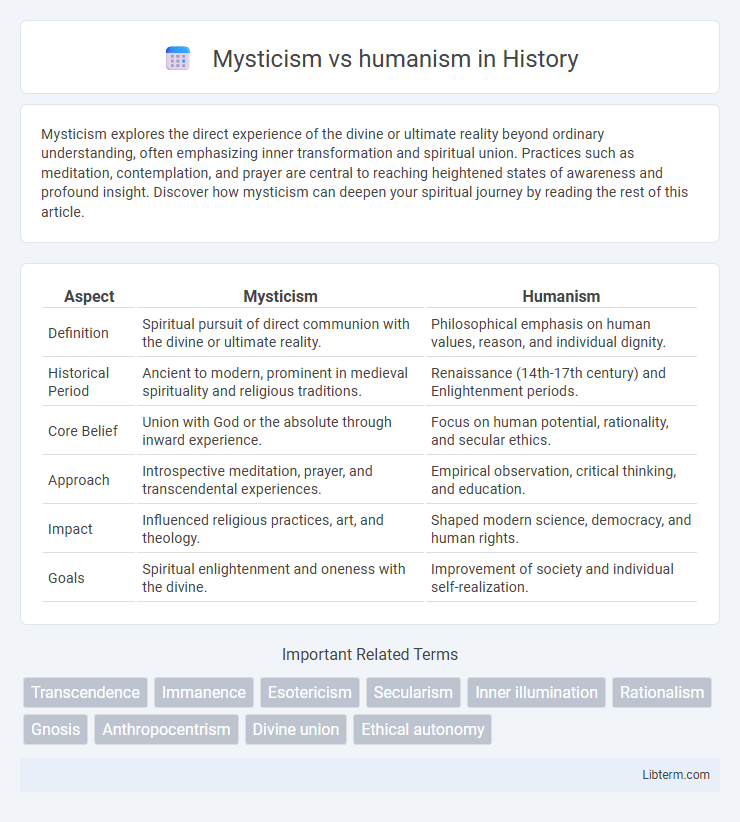Mysticism explores the direct experience of the divine or ultimate reality beyond ordinary understanding, often emphasizing inner transformation and spiritual union. Practices such as meditation, contemplation, and prayer are central to reaching heightened states of awareness and profound insight. Discover how mysticism can deepen your spiritual journey by reading the rest of this article.
Table of Comparison
| Aspect | Mysticism | Humanism |
|---|---|---|
| Definition | Spiritual pursuit of direct communion with the divine or ultimate reality. | Philosophical emphasis on human values, reason, and individual dignity. |
| Historical Period | Ancient to modern, prominent in medieval spirituality and religious traditions. | Renaissance (14th-17th century) and Enlightenment periods. |
| Core Belief | Union with God or the absolute through inward experience. | Focus on human potential, rationality, and secular ethics. |
| Approach | Introspective meditation, prayer, and transcendental experiences. | Empirical observation, critical thinking, and education. |
| Impact | Influenced religious practices, art, and theology. | Shaped modern science, democracy, and human rights. |
| Goals | Spiritual enlightenment and oneness with the divine. | Improvement of society and individual self-realization. |
Defining Mysticism: Core Concepts and Principles
Mysticism centers on the direct, personal experience of the divine or ultimate reality, emphasizing inner transformation and spiritual union beyond intellectual understanding. Its core principles include transcendence, unity with the cosmos or God, and the pursuit of enlightenment through meditation, prayer, or contemplative practices. Unlike humanism, which prioritizes human reason and empirical evidence, mysticism values intuitive knowledge and esoteric wisdom as means to explore existence and consciousness.
Understanding Humanism: Philosophy and Values
Humanism centers on the belief in human dignity, reason, and ethics as the foundation for building meaningful lives and societies. This philosophy emphasizes empirical evidence, critical thinking, and individual autonomy while promoting values such as equality, justice, and human rights. Unlike mysticism, which relies on spiritual experiences and the transcendent, humanism seeks to understand and improve the human condition through rational inquiry and secular principles.
Historical Origins of Mysticism and Humanism
Mysticism originated in ancient religious traditions, emphasizing direct, personal experiences of the divine through meditation, prayer, and transcendence, with roots in early Christianity, Sufism, and Eastern philosophies such as Hinduism and Buddhism. Humanism emerged during the Renaissance, drawing from classical Greek and Roman texts, prioritizing human reason, ethics, and empirical evidence over divine authority. These historical foundations reflect mysticism's focus on spiritual union and inner enlightenment versus humanism's stress on secular knowledge and human potential.
Key Figures in Mysticism and Humanism
Key figures in mysticism include Meister Eckhart, whose teachings on the direct experience of the divine emphasize personal spiritual union, and Julian of Norwich, known for her vivid mystical visions and theological insights during the Middle Ages. In humanism, prominent figures such as Erasmus championed the revival of classical learning and emphasized human dignity and rational thought during the Renaissance, while Petrarch is credited with laying the foundations for the humanist emphasis on individual potential and secular scholarship. These influential thinkers shaped their respective movements by advancing spiritual introspection in mysticism and promoting critical inquiry and human-centered values in humanism.
Mysticism vs Humanism: Core Differences
Mysticism centers on the pursuit of direct, personal experience with the divine or ultimate reality, emphasizing spiritual intuition and transcendence beyond rational thought. Humanism prioritizes human reason, ethics, and empirical evidence, focusing on human values and the potential for progress without reliance on supernatural beliefs. The core difference lies in mysticism's inward, spiritual quest for transcendence contrasted with humanism's outward, rational approach grounded in human experience and scientific inquiry.
Common Ground: Where Mysticism Meets Humanism
Mysticism and humanism intersect in their shared quest for deeper meaning and enhanced understanding of human experience beyond material existence. Both emphasize personal growth, self-awareness, and the intrinsic value of compassion and ethical living. This common ground highlights the potential for integrating spiritual insight with a human-centered approach to improve individual and collective well-being.
Mystical Practices and Humanist Ethics
Mystical practices emphasize direct, personal experiences of the divine or ultimate reality through meditation, contemplation, and ritual, fostering a deeper spiritual connection beyond rational understanding. Humanist ethics prioritize reason, autonomy, and the intrinsic value of human beings, promoting moral principles based on empathy, human rights, and social justice without reliance on supernatural beliefs. The contrast highlights the mystical pursuit of transcendent knowledge versus humanism's focus on ethical living grounded in human experience and rational inquiry.
Influence on Modern Thought and Culture
Mysticism has profoundly shaped modern spirituality and art by inspiring personal introspection and transcendent experiences, fostering a culture that values inner transformation and metaphysical exploration. Humanism emphasizes reason, ethics, and empirical evidence, driving scientific progress and secular human rights movements that advocate for individual dignity and societal well-being. The interplay between mysticism's spiritual insights and humanism's rational inquiry continues to influence contemporary debates on meaning, consciousness, and the role of religion in public life.
Critiques and Controversies in Both Movements
Mysticism faces critiques for its reliance on subjective, often unverifiable spiritual experiences, leading skeptics to question its epistemological foundations and potential for dogmatism. Humanism attracts controversy over its perceived secularism, with opponents arguing it underestimates the significance of transcendental or religious dimensions in human life. Both movements provoke debates surrounding the balance between faith and reason, individual experience versus universal ethics, and the scope of human knowledge and value systems.
The Future of Mysticism and Humanism in Society
The future of mysticism and humanism in society hinges on their evolving roles in addressing existential questions and ethical frameworks amid technological advancements. Mysticism offers profound spiritual insights and experiential wisdom, while humanism emphasizes rationality, human rights, and scientific progress. Integrating both paradigms could foster holistic development by balancing inner transcendence with societal well-being and innovation.
Mysticism Infographic

 libterm.com
libterm.com